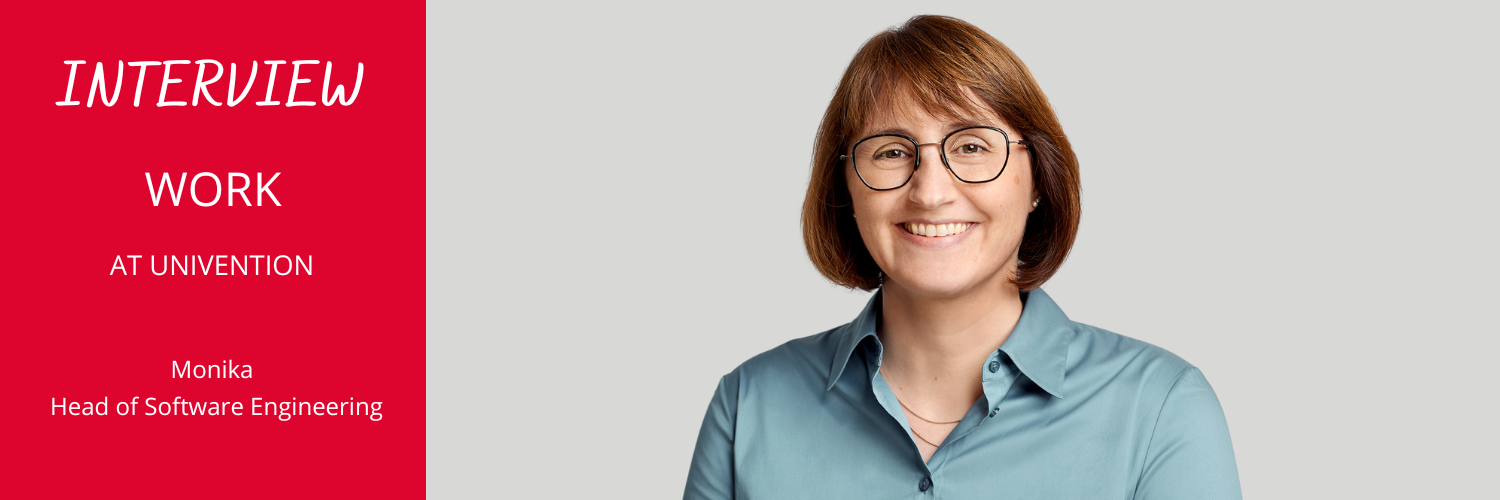Here at Univention, it is a matter of course that women work in development and hold management positions. Our best example is Monika. As Head of Software Engineering, she is responsible for software development, including product development and maintenance, as well as new and further developments. In this interview, she talks about diversity in teams, her first encounters with open source software, and the importance of open communication.
Hello Monika! Tell us about your responsibilities and the processes you are in charge of.
I am responsible for software development. It includes our product development with the maintenance of our products, new and further development of features, further developments on behalf of customers as well as cooperation in various projects.
As Head of Software Engineering, I mainly deal with organizational issues, such as creating our implementation plan for the next quarter or designing interfaces with other departments at Univention – and everything that helps my teams to get their work done.
A very important part of my job is keeping in touch with my employees, listening to them, talking to them about their development and pursuing it together.
How many employees are in your teams?
There are a total of 30 people working in the teams I supervise. Of these, 19 are permanent employees, plus a couple of trainees, students and freelancers.
The people work in different locations: Bremen, Leipzig, Berlin, remotely all over Germany, and for almost a year now, we also have colleagues in Serbia and Spain.
Is there anything special about being a woman working in the male-dominated IT industry?
Working with my colleagues has always been pleasantly objective and goal-oriented. Even during my studies, I worked more with men than with women. As a result, it quickly became second nature, and I didn’t even consciously notice it later. I am curious what my male colleagues say when they are asked what is special about working with a woman.
I think it is important to have women in development teams as well. It is about diversity and balance. While I do not want to generalize too much, I think I have noticed over the years that women communicate differently. This creates different team dynamics, and also helps to identify aspects of a problem that are important to solve a task.
Sometimes it is easier for women to keep an eye on the team as a whole. They have a better overview of who is working on what and how the individual work strands come together.
What brought you to open source software and what experience did you have with it prior to working at Univention?
Before I joined Univention, I had little experience with open source software. I have spent my entire career in IT in the healthcare industry. Although there is a lot of networking, e.g. between service providers, the industry is characterized by proprietary software. As a result, I know many of the resulting challenges from my experience. I have found that the path to true connectivity that delivers tangible benefits to physicians and patients is sometimes longer and more difficult than it needs to be.
In my opinion, the digital sovereignty of physicians is currently very limited: many are reluctant to change their practice management system. They are afraid that the data will not be transferred correctly and completely to the new system.
What are your experiences working at Univention?
For me, what distinguishes Univention from other companies is its openness, even in difficult situations, not only within the company but also with customers and business partners. It does not necessarily solve problems but lays the foundation for trusting cooperation. And that, in turn, is necessary to find the best possible solutions.
I am particularly impressed by how much our developers identify with our products. They put so much commitment, enthusiasm, brainpower and passion into them.
One challenge that stood out last year was the growth of Univention. In software development, this meant that we had nine new colleagues in seven months. We also had to switch to English for our regular team meetings. Training the new developers was an additional challenge, especially for experienced colleagues. I am proud to see how they handled it all.
Please tell us something about your extra-professional activities and your interests.
As mentioned above, I am very interested in the further development of individuals and organizations, agility, the organization in complexity, and new work.
As a balance to work, I like to go for walks with my dog. We enjoy nature, and I am always fascinated by how dogs communicate with us and with each other.
